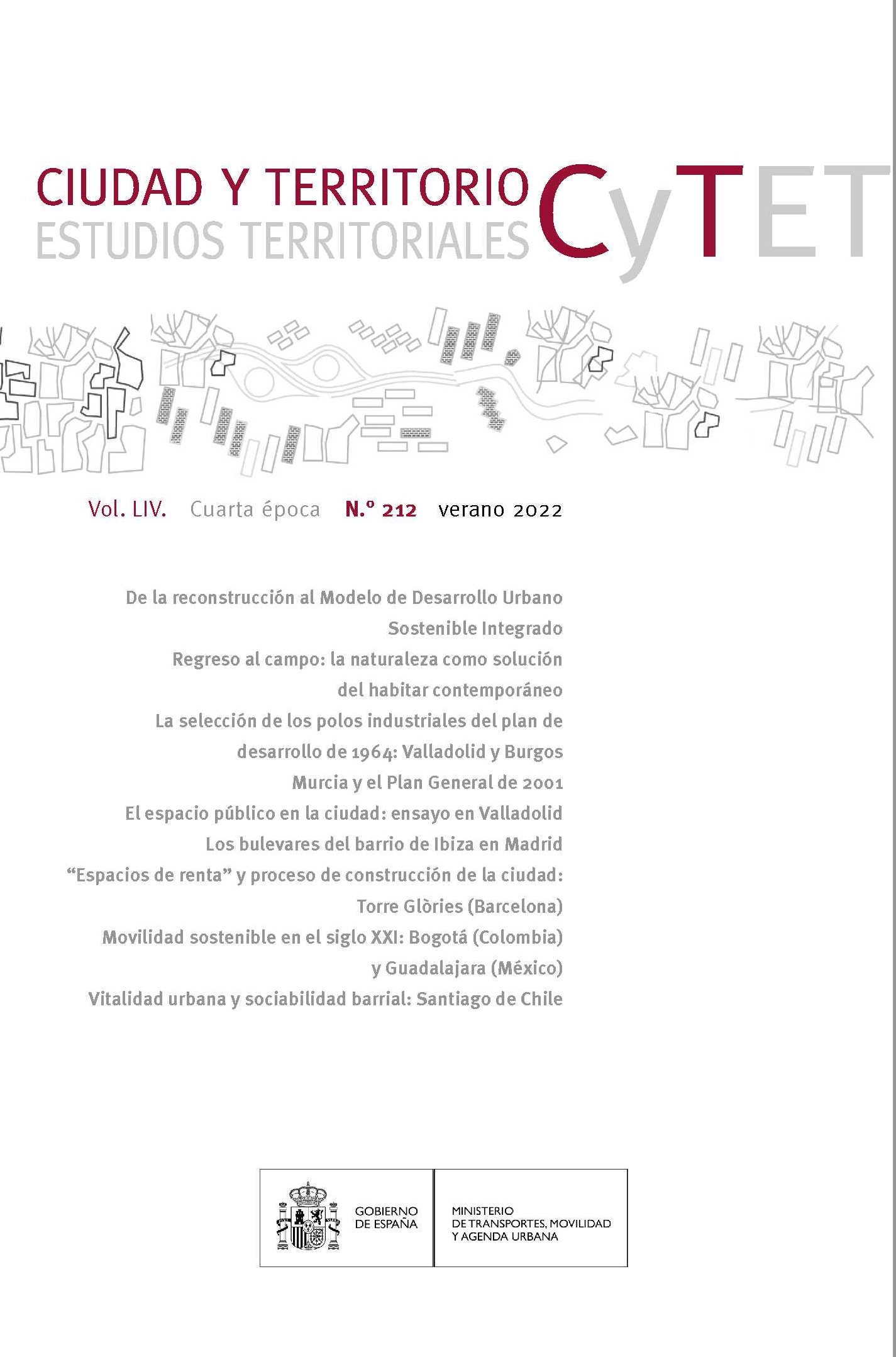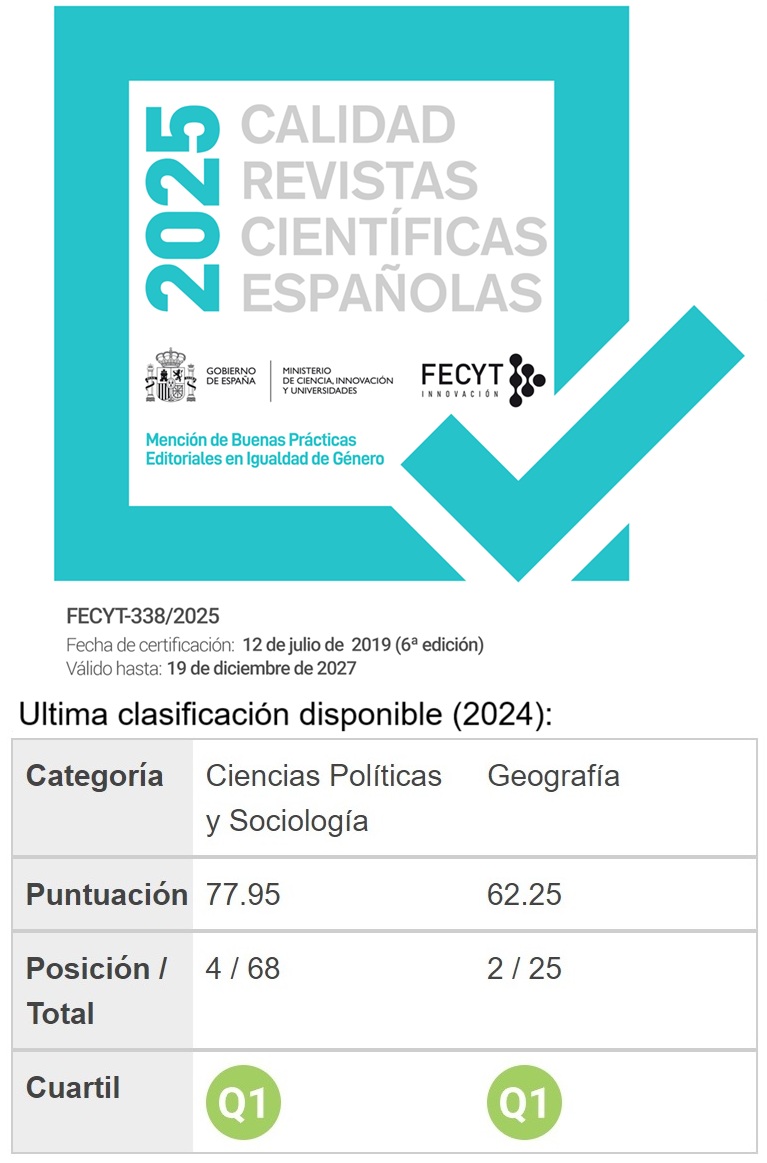Incentivos económicos para el fomento de la rehabilitación edificatoria en Portugal
DOI:
https://doi.org/10.37230/CyTET.2022.212.12Palabras clave:
Rehabilitación, Regeneración urbana, Financiación, Instrumento Financiero, Fondos Europeos Estructurales y de InversiónResumen
El presente trabajo analiza iniciativas que contribuyen a aumentar el ritmo de la rehabilitación edificatoria en Portugal, a través de ayudas de carácter económico, con el objetivo de establecer una base que pueda llevar, en estudios posteriores, a la comparación de iniciativas entre países o incluso al estudio de la aplicabilidad de determinadas medidas al caso nacional. Para ello, se describen las características de los principales programas de apoyo en el país luso, aportando los resultados que han producido, así como sus fortalezas y puntos débiles. De esta manera, se ha podido comprobar la diversidad de los programas existentes y su capacidad para dar solución a diferentes problemáticas, con diferentes escalas y necesidades, a nivel financiero y técnico.
Descargas
Citas
Agência para o Desenvolvimento e Coesão, I.P. (2020): Portugal 2020 Relatório Anual 2019, número 5. https://portugal2020.pt/wp-content/uploads/raf_2019_27072020_vf_0.pdf
Agência para o Desenvolvimento e Coesão, I.P (n.d.): FAQ Portugal 2020.Eurostat (2020): GDP at current market prices, 2009 and 2017-2019: https://ec.europa.eu/eurostat/statistics-explained/index.php?title=File:GDP_at_current_market_prices,_2009_and_2017-2019_FP20.png
Fi-Compass (2019): Financial instruments for urban development in Portugal – IFRRU 2020. Case Study.: https://www.fi-compass.eu/sites/default/files/publications/IFRRU%202020%2C%20Portugal.pdf
Fundiestamo, SA (2020a): FNRE – Fundo Nacional de Reabilitação do Edificado. Subfundo ImoMadalena. Relatório e contas 2019. https://fundiestamo.com/wp-content/uploads/2021/04/RC_ImoMadalena.pdf
Fundiestamo, SA (2020b): FNRE – Fundo Nacional de Reabilitação do Edificado. Subfundo ImoAveiro. Relatório e contas 2019. https://fundiestamo.com/wp-content/uploads/2021/04/RC_ImoAveiro.pdf
Fundiestamo, SA (2020c): FNRE – Fundo Nacional de Reabilitação do Edificado. Subfundo ImoResidências. Relatório e contas 2019. https://fundiestamo.com/wp-content/uploads/2021/04/RC_ImoResidencias.pdf
García Madruga, C. & Nicolás Buxens, O. & Molina Costa, P. &Sopelana Gato, A. (2019): (03) Estudio comparado sobre financiación y políticas de apoyo a la rehabilitación en países de la UE [Estudio (03) para la ERESEE 2020 “Estrategia a largo plazo para la Rehabilitación Energética en el Sector de la Edificación en España”]. https://cdn.mitma.gob.es/portal-web-drupal/planes_estartegicos/3_2020_estudio_financiacion_y_politicas_ue.pdf
INE (2019): População residente em cidades (N.º) por Local de residência (NUTS – 2013), 2018:https://www.ine.pt/xportal/xmainxpid=INE&xpgid=ine_indicadores&indOcorrCod=0008306&contexto=pi&selTab=tab0
INE (2021a): População residente (N.º) por Local de residência (Resultados provisórios), e Grupo etário, 2021. https://www.ine.pt/xportal/xmainxpid=INE&xpgid=ine_indicadores&indOcorrCod=0011187&contexto=bd&selTab=tab2
INE (2021b): Edifícios ( N.º) por Localização geográfica e Tipos de edificio clássico, 2021.https://www.ine.pt/xportal/xmainxpid=INE&xpgid=ine_indicadores&indOcorrCod=0011156&contexto=bd&selTab=tab2
INE (2021c): Alojamentos (N.º) por Localização geográfica e Tipo (alojamento), 2021.https://www.ine.pt/xportal/xmainxpid=INE&xpgid=ine_indicadores&indOcorrCod=0011158&contexto=bd&selTab=tab2
Instituto da Habitação e da Reabilitação Urbana (n.d.): Programa Reabilitar para Arrendar. Habitação Acessível. Regulamento. https://www.portaldahabitacao.pt/documents/20126/35918/RpA_HARegulamento20180718.pdf/0c8557e9-adf0-ee96-615d-7670c287c1b7?t=1559750817074
Instituto da Habitação e da Reabilitação Urbana (2017): Reabilitar para Arrendar [Presentación del programa, Amadora].
Portal Casa Eficiente 2020: https://casaeficiente2020.pt/
Portal da Habitação: https://casaeficiente2020.pt/
Portal das Finanças: https://www.portaldasfinancas.gov.pt/at/html/index.html
Portal IFRUU 2020: https://ifrru.ihru.pt
Portal Portugal 2020: https://portugal2020.pt/
República Portuguesa (2018a): Cidades com futuro. Reabilitar para revitalizar as nossas cidades [Guía rápida del beneficiario]. https://ifrru.ihru.pt/web/guest/guia-rapido-do-beneficiario
República Portuguesa (2018b): Casa Eficiente 2020: Regulamento. https://casaeficiente2020.pt/media/1148/regulamento-casa-eficiente-2018-03-01.pdf
República Portuguesa (n.d.): Cidades com futuro. Reabilitar para revitalizar as nossas cidades [Folleto informativo].
República Portuguesa.Direção Geral de Energia e Geologia & Portugal Energia (2017): Estratégia nacional a longo prazo para a mobilização de investiento na renovação de edifícios. https://ec.europa.eu/energy/sites/default/files/documents/pt_building_renov_2017_pt.pdf
República Portuguesa & Estrutura de Gestão do Instrumento Financeiro para a Reabilitação e Revitalização Urbanas (2020): Guia do beneficiário. https://ifrru.ihru.pt/web/guest/guia-do-beneficiario
República Portuguesa.Fundo Ambiental & Agência Portuguesa do Ambiente (2019): Roteiro para a Neutralidade Carbónica 2050 (RNC2050). Estratégia de Longo Prazo para a Neutralidade Carbónica da Economia Portuguesa en 2050. https://www.portugal.gov.pt/download-ficheiros/ficheiro.aspx?v=%3d%3dBAAAAB%2bLCAAAAAAABACzMDexAAAut9emBAAAAA%3d%3d
Santos Júlio, E. (2018): Fundo Nacional para a Reabilitação do Edificado [Presentación del programa, Aveiro].
Santos Júlio, E & Fundiestamo, SA (2020): Guia FNRE – Fundo Nacional de Reabilitação do Edificado. https://fundiestamo.com/wp-content/uploads/2020/07/Guia-FNRE-Fundo-Nacional-de-Reabilitacao-do-Edificado.pdf
Souto de Miranda, A. (n.d.): O Fundo Nacional de Reabilitação do Edificado – FNRE [Presentación].
Publicado
Cómo citar
Número
Sección
Licencia
Derechos de autor 2022 Marta Gómez-Gil

Esta obra está bajo una licencia internacional Creative Commons Atribución-NoComercial-SinDerivadas 4.0.
Sin perjuicio de lo dispuesto en la legislación vigente sobre Propiedad Intelectual, y conforme a la misma, el/la los/las autor/a/es/as que publiquen en CyTET cede/n a título gratuito, de modo no exclusivo y sin límite temporal al Ministerio de Transportes, Movilidad y Agenda Urbana los derechos para difundir, reproducir, comunicar y distribuir en cualquier formato actual o futuro, en papel o electrónico, la versión original o derivada de su obra bajo licencia de Creative Commons Reconocimiento-NoComercial-SinObraDerivada 4.0 Internacional (CC BY-NC-ND 4.0), así como para incluir o ceder a terceros la inclusión de su contenido en índices, repositorios y bases de datos nacionales e internacionales, con referencia y reconocimiento en todo caso de la autoría del mismo.
Además, al realizar el envío, el/la los/las autor/a/es/as declara/n que se trata de un trabajo original en el que se reconocen las fuentes que han sido utilizadas en su estudio, comprometiéndose a respetar la evidencia científica y a no modificar los datos originales para verificar o refutar una hipótesis de partida; que el contenido esencial del mismo no ha sido publicado previamente ni se publicará en ninguna otra obra o revista mientras esté en proceso de evaluación en la revista CyTET; y que no se ha remitido simultáneamente a otra publicación.
Los autores deben firmar un Formulario de Cesión de Derechos, que les será enviado desde la Secretaría de CyTET una vez se acepte su artículo para ser publicado.
Con el objetivo de favorecer la difusión del conocimiento, CyTET se adhiere al movimiento de revistas de Open Access (OA) y entrega la totalidad de sus contenidos a diversos índices, repositorios y bases de datos nacionales e internacionales bajo este protocolo; por tanto, la remisión de un trabajo para ser publicado en la revista presupone la aceptación explícita por parte del autor/a de este método de distribución.
Se anima a las/os autoras/es a reproducir y alojar sus trabajos publicados en CyTET en repositorios institucionales, páginas web, etc. con la intención de contribuir a la mejora de la transferencia del conocimiento y de la citación de dichos trabajos.








 Enlace a CyTET en Linkedin
Enlace a CyTET en Linkedin